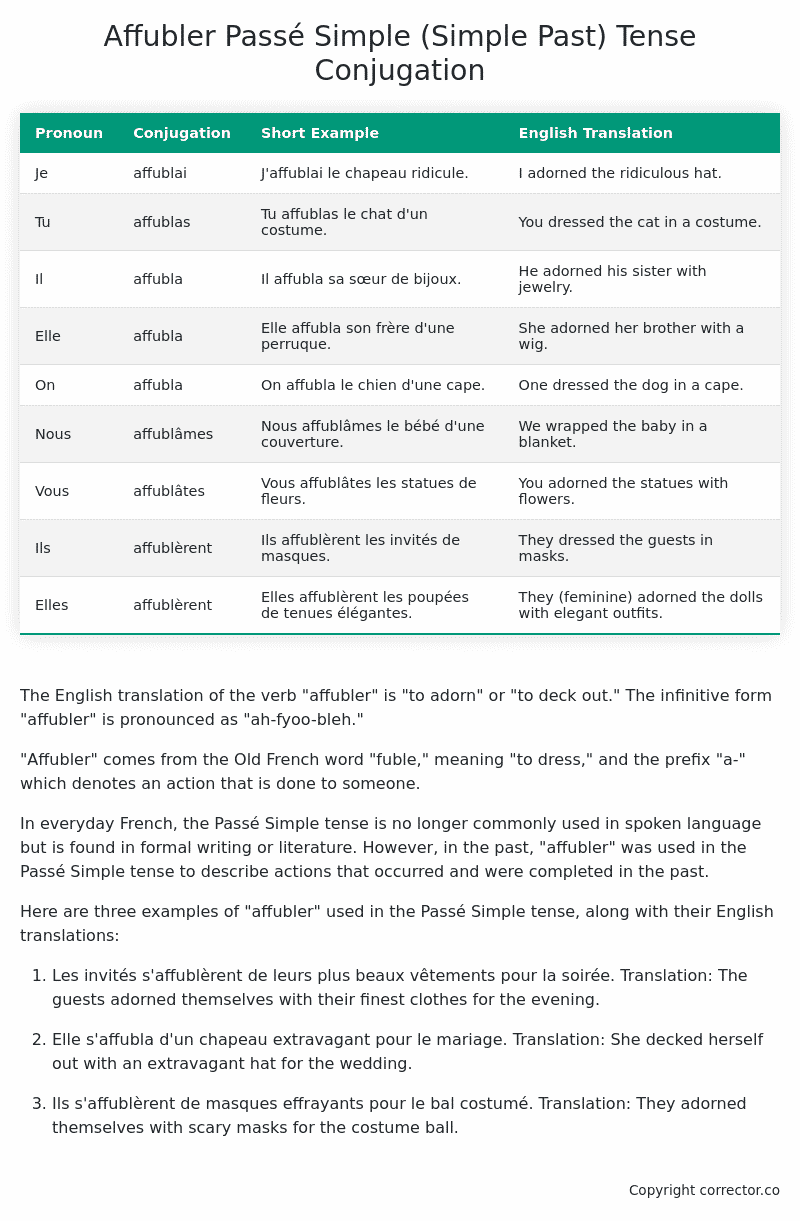Passé Simple (Simple Past) Tense Conjugation of the French Verb affubler
Introduction to the verb affubler
The English translation of the verb “affubler” is “to adorn” or “to deck out.” The infinitive form “affubler” is pronounced as “ah-fyoo-bleh.”
“Affubler” comes from the Old French word “fuble,” meaning “to dress,” and the prefix “a-” which denotes an action that is done to someone.
In everyday French, the Passé Simple tense is no longer commonly used in spoken language but is found in formal writing or literature. However, in the past, “affubler” was used in the Passé Simple tense to describe actions that occurred and were completed in the past.
Here are three examples of “affubler” used in the Passé Simple tense, along with their English translations:
-
Les invités s’affublèrent de leurs plus beaux vêtements pour la soirée.
Translation: The guests adorned themselves with their finest clothes for the evening. -
Elle s’affubla d’un chapeau extravagant pour le mariage.
Translation: She decked herself out with an extravagant hat for the wedding. -
Ils s’affublèrent de masques effrayants pour le bal costumé.
Translation: They adorned themselves with scary masks for the costume ball.
Table of the Passé Simple (Simple Past) Tense Conjugation of affubler
| Pronoun | Conjugation | Short Example | English Translation |
|---|---|---|---|
| Je | affublai | J’affublai le chapeau ridicule. | I adorned the ridiculous hat. |
| Tu | affublas | Tu affublas le chat d’un costume. | You dressed the cat in a costume. |
| Il | affubla | Il affubla sa sœur de bijoux. | He adorned his sister with jewelry. |
| Elle | affubla | Elle affubla son frère d’une perruque. | She adorned her brother with a wig. |
| On | affubla | On affubla le chien d’une cape. | One dressed the dog in a cape. |
| Nous | affublâmes | Nous affublâmes le bébé d’une couverture. | We wrapped the baby in a blanket. |
| Vous | affublâtes | Vous affublâtes les statues de fleurs. | You adorned the statues with flowers. |
| Ils | affublèrent | Ils affublèrent les invités de masques. | They dressed the guests in masks. |
| Elles | affublèrent | Elles affublèrent les poupées de tenues élégantes. | They (feminine) adorned the dolls with elegant outfits. |
Other Conjugations for Affubler.
Le Present (Present Tense) Conjugation of the French Verb affubler
Imparfait (Imperfect) Tense Conjugation of the French Verb affubler
Passé Simple (Simple Past) Tense Conjugation of the French Verb affubler (You’re reading it right now!)
Passé Composé (Present Perfect) Tense Conjugation of the French Verb affubler
Futur Simple (Simple Future) Tense Conjugation of the French Verb affubler
Futur Proche (Near Future) Tense Conjugation of the French Verb affubler
Plus-que-parfait (Pluperfect) Tense Conjugation of the French Verb affubler
Passé Antérieur (Past Anterior) Tense Conjugation of the French Verb affubler
Futur Antérieur (Future Anterior) Tense Conjugation of the French Verb affubler
Subjonctif Présent (Subjunctive Present) Tense Conjugation of the French Verb affubler
Subjonctif Passé (Subjunctive Past) Tense Conjugation of the French Verb affubler
Subjonctif Imparfait (Subjunctive Imperfect) Tense Conjugation of the French Verb affubler
Subjonctif Plus-que-parfait (Subjunctive Pluperfect) Tense Conjugation of the French Verb affubler
Conditionnel Présent (Conditional Present) Tense Conjugation of the French Verb affubler
Conditionnel Passé (Conditional Past) Tense Conjugation of the French Verb affubler
Conditionnel Passé II (Conditional Past II) Tense Conjugation of the French Verb affubler
L’impératif Présent (Imperative Present) Tense Conjugation of the French Verb affubler
L’impératif Passé (Imperative Past) Tense Conjugation of the French Verb affubler
L’infinitif Présent (Infinitive Present) Tense Conjugation of the French Verb affubler
L’infinitif Passé (Infinitive Past) Tense Conjugation of the French Verb affubler
Le Participe Présent (Present Participle) Tense Conjugation of the French Verb affubler
Le Participe Passé (Past Participle) Tense Conjugation of the French Verb affubler
Struggling with French verbs or the language in general? Why not use our free French Grammar Checker – no registration required!
Get a FREE Download Study Sheet of this Conjugation 🔥
Simply right click the image below, click “save image” and get your free reference for the affubler Passé Simple tense conjugation!

Affubler – About the French Passé Simple (Simple Past) Tense
Formation
Usage
Narration
Historical Context
Interactions with other tenses
Passé Composé
Imparfait
Conditional and Subjunctive
Summary
I hope you enjoyed this article on the verb affubler. Still in a learning mood? Check out another TOTALLY random French verb conjugation!


